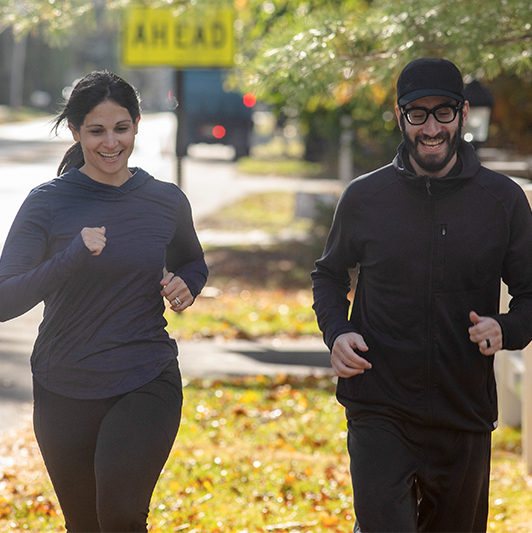5 Ways To Help Fight the Flu

December 11, 2019
During the winter months, hundreds of thousands of people will catch the influenza virus, a respiratory infection marked by these symptoms:
- Fever or chills
- Cough
- Sore throat
- Runny nose
- Headaches
- Fatigue
- Vomiting and diarrhea (more common in children than adults)
Most people recover from the flu in as little as a few days or as long as a couple of weeks, but for some groups, the flu can lead to serious complications. It can be life-threatening for infants under 6 months of age, people who are 50 to 75 years old, and people who have chronic health problems (like asthma, diabetes or heart disease) or compromised immune systems.
Complications from flu can be mild, such as sinus or ear infections, or more severe. Pneumonia and inflammation of the heart or brain can be very serious and require the patient be hospitalized.
Here are five things you and your family can do to help fight the flu:
1. Get the flu shot.
The best thing to do is make sure that all members of your family who are at least six months old have a flu shot this year. This vaccination stimulates your body’s immune system to make antibodies that can fight the virus if you are exposed to it later.
Unlike other vaccinations, such as those for polio or measles, people need to have a flu shot annually. This is because every year, there are different strains that cause influenza in the population. The flu shot you receive this year will guard against the three or four strains that doctors predict will be most prevalent in the upcoming flu season.
“There are certain people that might need to look into other options for their flu vaccine,” says Jasmine Baez, M.D., an internal medicine doctor. “Those who have a severe allergy to eggs or who have had a bad reaction to the flu shot previously should speak to their doctor about whether the nasal flu vaccine might be a better choice.”
Unfortunately, even the flu shot isn’t 100 percent effective. Sometimes a different strain of the virus appears or you might be exposed to the flu before your shot establishes immunity.
2. Wash your hands frequently.
Flu is extremely contagious and can spread via droplets produced when coughing, sneezing, or talking or by touching contaminated surfaces. People often touch their eyes, nose and mouth without even realizing it, and germs can get into our bodies that way. People can also touch foods or drinks with germs on their hands. When those items are consumed they can make you sick. Washing frequently with soap and clean water is critical
3. Avoid crowds during the peak flu season.
Large entertainment venues or travel hubs are places where germs can circulate easily. If you do find yourself in a crowd, you can avoid picking up germs by carrying a small bottle of hand sanitizer and using it when you can’t make it to a sink.
4. If you do get sick, stay home for 24 hours after your fever passes.
If you do get sick with the flu, it’s important that you limit your exposure to others to avoid the spread of illness. Cover your mouth and nose with as tissue or the crook of your arm when your sneeze or cough.
Pro tip: Use a rubber band to keep an old tissue box attached to the one you’re using to have a built-in garbage can for those germy tissues!
5. Talk to your doctor about antiviral medication.
There are also medications that can help people who contract the flu. “Antiviral medications may be recommended for people who have a high risk of developing complications,” says Lauren Parkes, D.O., family medicine provider. “Because they disrupt functions of the virus itself, they can reduce the duration of the disease, as well as limit spreading it to others.”
These benefits are most effective when the medication is taken shortly after flu symptoms first appear, within 48 hours. People with high risk of complications should see their doctor as soon as possible if they suspect they have the flu.
Next Steps & Resources
- Meet our sources: Lauren Parkes, D.O. and Jasmine Baez, M.D.
- To make an appointment with Dr. Parkes, Baez, or a physician near you, call 800-822-8905 or visit our website.
The material provided through HealthU is intended to be used as general information only and should not replace the advice of your physician. Always consult your physician for individual care.
How To Add a New, Healthy Habit to Your Life

For many people, the new year feels like a clean slate: It can be a time to ditch unwanted habits, like overeating or being sedentary.
How Often Should You Wash Your Clothes?

How clean is the outfit that you’re wearing today?

RECIPE: Hearty Whole Wheat Pancakes
Pancakes can be a nourishing breakfast choice when made with wholesome ingredients.

Are Massage Guns Good for You? A PT Explains
Physical therapist Ilyza Weiss explains how to safely incorporate a massage gun into your wellness routine.

Easy Morning Exercises for Busy Parents
Does raising kids get in the way of your intentions to exercise regularly? Many busy parents plan to work out every day, but plenty of them go to bed each night without having found the time for any meaningful physical activity.

Should I Stop Cracking My Knuckles & Back?
Cracking your fingers and back after a long day feels good, doesn't it? But what's behind all the popping? Should we stop doing it? Our expert breaks it down.